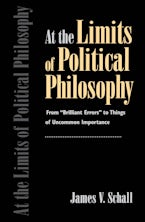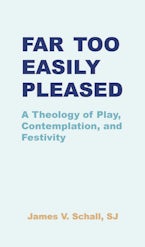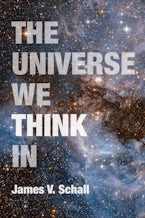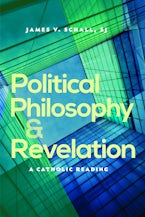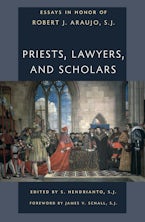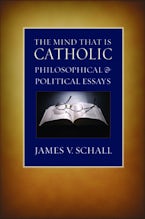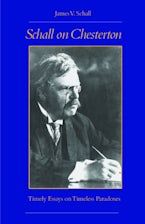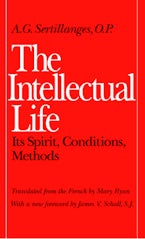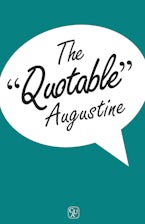- Home
- political science
- At the Limits of Political Philosophy
Preparing your PDF for download...
There was a problem with your download, please contact the server administrator.
At the Limits of Political Philosophy
From "Brilliant Errors" to Things of Uncommon Importance
Imprint: Catholic University of America Press
How do politics and religion point to each other in a way that respects the integrity of both? Why are reason and revelation not in absolute opposition to each other? Political philosophy asks questions such as these that seem to call forth responses that do not come from politics alone. In seeking the answers, James V. Schall presents, in a convincing and articulate manner, the revelational contribution to political philosophy, particularly that which comes out of the Roman Catholic tradition. In At the Limits of Political Philosophy he fills the need for a sustained account of the higher reaches of political philosophy, where questions arising within the discipline bring it to its own limits.
In the first section of the book, Schall points out what Leo Strauss called the "brilliant errors" that have arisen in the history of political philosophy and provides sober responses to those errors. He insists that neither the reality of evil nor the possibility of good within the city is completely explained within political philosophy, and he calls on political philosophy to acknowledge and respect its own boundaries.
Schall maintains that a noncontradictory unity exists among three aspects of political philosophy—the problem of evil, the problem of virtue, and the problem of contemplation of the highest things. Thus in the second section of his book he moves to a discussion of "imperfect and dire conditions of human existence": death, evil, suffering, injustice, hell. He espouses a "political realism" that understands them to be permanent realities in this world, realities that cannot be eliminated by human means.
The third section treats the death of Socrates, the death of Christ, and the reality and meaning of happiness and of virtue. Schall examines the two deaths to show how ultimate issues arise within particular political instances and how they lead people to ask those questions about happiness and virtue that reveal the higher calling of human life. He maintains that political philosophy cannot be consistent with itself and not think about these higher realities. Finally, Schall addresses science, law, and friendship, which raise questions of truth, good, and love that are not adequately understood if viewed only in their political contexts. These are ideas that point to the deepest meaning of human experience; their uncommon importance requires political philosophy to consider them.
James V. Schall, S.J., holds master's degrees in philosophy and in sacred theology, and a Ph.D. in political philosophy. He is professor of government at Georgetown University and the author of numerous books and articles in the field of political philosophy.
"An attentive reader will get from this stimulating book wise instruction on what is worth fighting for and on the limits of the possible in political action."
~Washington Times
"This thoughtful book... provokes all of us, whether believer or unbeliever, to confront again or for the first time, the insoluble mystery that is reason and Revelation."
~Crisis Magazine
"Professors only very rarely possess Schall's combination of erudition, thoughtfulness, clarity, and self-confidence. Only a great teacher could have written this immensely instructive book."
~Perspectives on Political Science
"One of the treats in store for Fr. Schall's readers is the facility with which he has learned to introduce and interpret the vast literature of political philosophy and its many cognate fields, and to show how it can illuminate the questions and problems that confront us today."
~The Review of Politics
"The greatness in Schall’s investigation is its humility. He acknowledges the frailty of the human person which is responsible for the ‘brilliant errors’ of the past. It is precisely this acceptance of human limitation that leads man to seek the transcendent, to be open to the gift of revelation—a gift that ‘does not arise from human sources.’ Yet, it is this gift that equips man and his society with the means to promote the individual and the common good—to foster the ‘deepest meaning of human existence.’ In short, Schall’s remarkable book helps us remember where we have been so that we can better chart where we must go."
~Journal of Church and State
"We have here a book of uncommon importance, to echo the book's subtitle. For many years, Father Schall, Professor of Politics at Georgetown University, has been writing essays in the popular and scholarly press on particular subjects, providing a philosophical comprehension of political, intellectual, and ecclesiastical events of the day. These past writings have been witty, incisive, and often brilliant. But with this book's publication, we see another side to this thinker. We are invited to study under Father Schall, the classroom teacher of political philosophy, as he guides us through the all-important exploration of the highest ethical aims to be sought in the City of Man. The reader is his student, who is privileged to sit through a sweeping course in the history of ideas as they affect the way we choose to organize ourselves as a society."
~The American Journal of Jurisprudence
"James V. Schall is one of the best kept secrets in the Christian academy… [His] fine book is necessary reading for anyone who wants to think seriously about the relation of reason and revelation. At the Limits of Political Philosophy contains more than a few original insights that are no doubt bound to challenge some of the preconceived theoretical ‘orthodoxies’ held by believers and unbelievers."
~American Catholic Philosophical Quarterly

